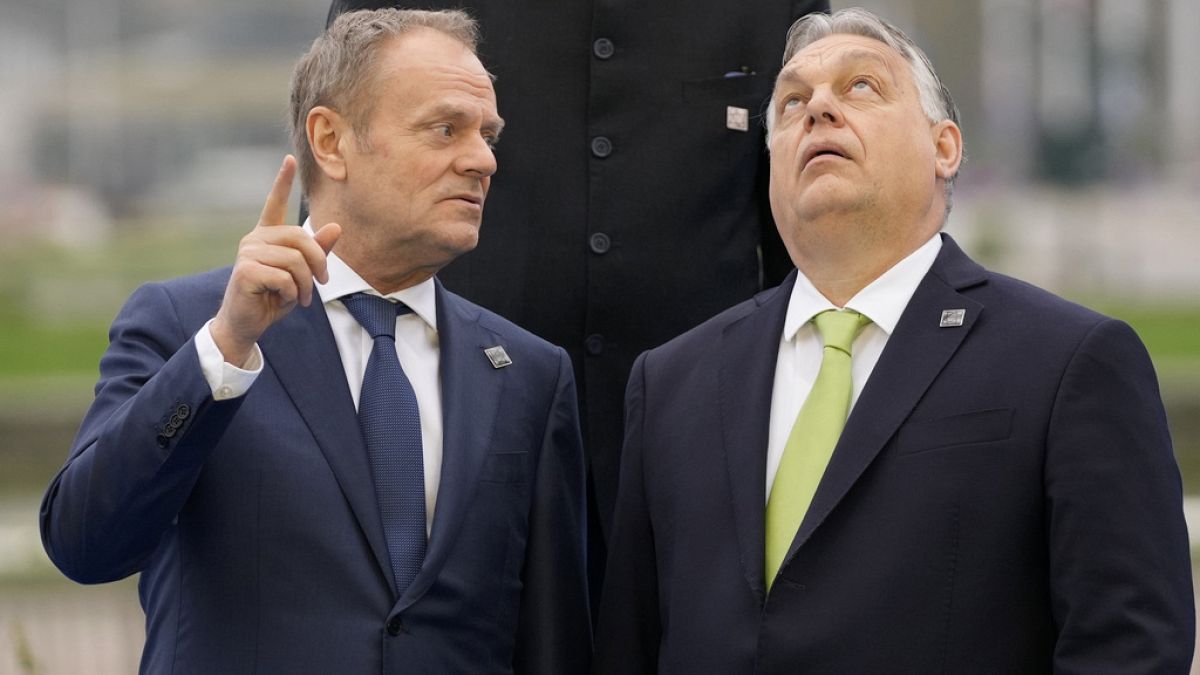What does the growing Musk-Meloni alliance mean for Italy and the EU?

Italy has led the way for Musk’s companies to invest in satellite internet and space. Will it in return be supported by the EU line on social media and issues dear to the right? An award the high-tech magnate presented to Meloni on Monday raises several questions.
On the sidelines of her engagements at the United Nations General Assembly on Monday evening, Italian premier Giorgia Meloni received a Global Citizenship Award presented by X owner and tech mogul Elon Musk.
The award is granted by the Atlantic Council, a think tank that has been working for cooperation between the US and Europe since 1961; for many observers, it seems to be an odd choice of recipient on this occasion given Meloni’s relatively short tenure and achievements in office so far.
Among those who have received it in recent years, for instance, include Ukrainian President Volodymyr Zelenskyy. Nonetheless, according to local media, it was Meloni herself who asked that Musk present it to her.
The award presentation has appeared to some as a solidifying of a relationship between Meloni and the South African billionaire but how significant are deepening links between the pair?
A possible alliance between Musk and Italy
Musk is increasingly using X, formerly Twitter, to express his support for former US President Donald Trump in the upcoming presidential election in November. And there are signs that Italy is next in his sights.
For now, his motives appear to be primarily economic.
On Sunday, the entrepreneur reposted a post on X featuring him with Andrea Stroppa, a young computer scientist credited as his operative in Italy by the newspaperLa Repubblica.
The post, written by American journalist SE Robinson Jr who follows the affairs of Musk’s companies, referred to “Article 25” which “is about to pave the way for Starlink as a backup system in Italy”.
Article 25 is a new framework that regulates access to space for public agencies and private companies that operate in Italy, and was approved by the Meloni government in June. It also applies to companies operating in Italy from foreign territories, like Musk’s SpaceX.
But this clause, in particular, requires Italy to equip itself with a “reserve of transmission capacity through satellite communications” to guarantee the functioning of strategic, military, and civil services in the event of a blackout of terrestrial Internet networks, something Musk’s Starlink satellite network has already achieved for Ukraine after the Russian invasion.
In this sense, Starlink is trying to beat off competition from European companies with Rome’s approval, which, according to Bloomberg, is aiming for investments in the space sector of around €7 billion from 2026.
Musk’s political offensive in Italy from Salvini to Meloni
Beyond the possible destination of investments from the Italian government, however, there also seems to be a harmony between Musk and the government in Rome on international politics.
Trump’s “sovereignist” worldview has been publicly shared by Musk and finds a firm foothold in Europe, starting with Orbán’s Hungary and the rising far-right forces in several EU countries.
Italy is among the few to have already made this transition, first politically and then in government with Melloni’s Fratelli d’Italia (Brothers of Italy) party, an ideal ally of a new Republican White House in 2025.
While waiting to see if he will accept the League’s invitation to the Pontida rally on 6 October, it is worth noting how the technology magnate has long been infatuated with the Italian right wing.
Last week, Musk commented on Meloni’s video message against illegal immigration, reposting a clip of the prime minister with the words “Bravo!”
On September 14, he had posted on X praising Matteo Salvini’s reaction to the Palermo prosecutor’s request for a conviction in the Open Arms trial.
The flirtation had already been cemented somewhat in December 2023 when Musk was a guest at Atreju, the political festival organised every year by Fratelli d’Italia, amidst suggestions of him opening Starlink satellite internet connections and Tesla factories in Italy.
On stage in Rome, Musk urged the crowd to “make more Italians,” referring to the demographic crisis that sees the birth rate in Italy among the lowest in Europe and in turn, showing his support for a cause célèbre of the Italian right wing.
What could the relationship mean for the EU?
The European Union’s own clampdown with the Digital Service Act (DSA) against radical content and fake news published by social platforms, as shown by the cases of Telegram and X itself, could be a reason for Musk’s interest in Italy.
After criticising X as a megaphone of the extreme right and defending its owner’s office by invoking freedom of expression, a more right-wing Europe with Italy weighing in on the Commission (albeit with Meloni’s European Conservatives and Reformists group of newly appointed commissioner Fitto in opposition in Parliament) could help soften Brussels’ line on social platforms and related sanctions.
World News || Latest News || U.S. News
Source link



